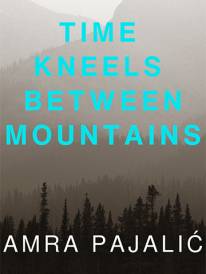Scott Derrickson The Day the Earth Stood Still Interview
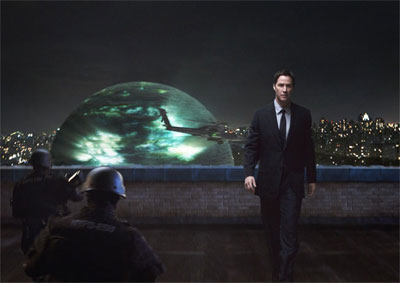
Director Derrickson Risks Earth Remake.
Scott Derrickson, The Day the Earth Stood Still Interview by Paul Fischer.Few directors would dare attempt remake one of the true iconic sci-fi classics of all time, but Scott Derrickson decided it was worth the risk. More known as a director of horror, this is Derrickson's first major Hollywood film, remaking Robert Wise's sci-fi classic about an alien warning earth about its imminent self-destruction. Paul Fischer reports.
Paul Fischer: Can you talk about taking a sacred text for science fiction buffs and making it for the 21st century?
Scott Derrickson: 20th Century Fox wanted to do a remake and I was the first of the people here to sign on to doing it. When I was given the script I was a bit skeptical. I do love the original very much. It's one of my two favorite Robert Wise films.
Paul Fischer: The other is?
Scott Derrickson: The Haunting. Picking two from his 40 I think is even quite a thing but for me it was really this, that in reading the screenplay, the screenplay certainly still needed work when I read it but I was struck by the idea that updating this movie had tremendous value because of the original being so rooted in the social issues of its time. It was such an intelligent and interesting self-reflective commentary, coming from an American studio and an American filmmaker, on the Cold War and the fear of the atomic bomb and the struggle to establish the UN, and things that were controversial and divisive. I loved the idea of being able to tell basically the same story but bring in these new social issues that we have now, these new interesting messes that we've gotten ourselves into now in the world and that alone seemed to have value to it and made sense. I think the other thing was it's been 57 years since the first one and you'd better have a good reason to remake a classic film but I do think that there's something different about this film as opposed to other classics, which are so much more known by the general movie-going audience and I think there's value to telling this story to the general movie-going population who for the most part won't have seen the original and won't know that story. My approach to it was that was the motivation and then the approach was to try to respect the original and also respect the fan base and the fact that it is a sacred movie to a lot of people
Paul Fischer: Wasn't this a green production?
Scott Derrickson: Yeah, this was Fox's first show that was a green production. The generators that were used...I honestly don't know all the ins and outs of it. I do know that there was a lot of effort that went into making it a true green show. It didn't have much of an effect, the only effect that it had on me personally was that it was paperless, and for a director storyboards become very complicated because they were all digital and so I never knew who had what. There was no notebook to carry around and that became confusing. But I think that, you know, I'll join in. We got rid of our SUV and got a hybrid and all that stuff but I'm also of the belief that those contributions are important but not in the end going to solve the problems. I really like Thomas Friedman who writes for the New York Times and his perspective on these issues and his statement, 'Don't change your light bulbs, change your leaders.' I think that the larger solutions are going to come from larger places
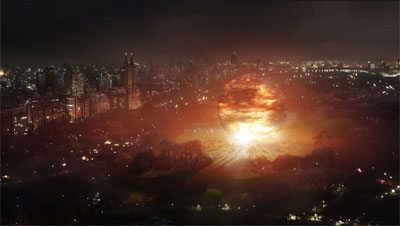 Paul Fischer: At the end of the film you save the earth but with a high price--New Jersey may no longer exist. What was the decision to walk that line between happy ending and not focusing on the negative impact of what happened?
Paul Fischer: At the end of the film you save the earth but with a high price--New Jersey may no longer exist. What was the decision to walk that line between happy ending and not focusing on the negative impact of what happened?Scott Derrickson: That's a good question, no one's asked me that question and it was something I thought a lot about. I think that the ideas of this movie and certainly what I think the movie is ultimately saying, I don't think it's a message movie. I'm not trying to tell anybody to do anything in particular. I'm just trying to be entertaining and tell an entertaining story and represent the world where it's at right now, but I like the idea that the solutions to the problems that we're creating in our world right now, I love the line when she says, "We can change. Can you stop this?" and he says, "It would come at a price for you and your way of life." So I wanted to find some way at the end to not just have everything wrap up perfectly and be inconsequential. There is a price. But I decided not to try to dissect exactly what that price would be because I don't know what it's going to be but I know it's the thinking that matters. It's that idea that the messes that we've gotten ourselves into as Americans and a species and a human race, the solutions to these will come at a price and we have to be willing to pay that price. So I liked the idea of being able put it out there for the audience to manage in their own minds what they think that price is and what the consequences of this would be ending the story there. There is an open-endedness to it. There's both closure and an open-endedness to what comes next after what just happened that I like and I appreciate that sometimes in movies, that they leave me having to decide for myself what I think that means, what I think just happened and what it means. I like that.
Paul Fischer: Why no cool flying saucer for Klaatu?
Scott Derrickson: When I went back, I watched the original quite a few times when just starting pre-production on the movie and like I was saying earlier you need to respect the original film, and try to figure out what made it great, and what can you take from the original to a modern audience that will work for them. And watching the flying saucer from the original land in Washington D.C., I think it was the second time I was watching the film through again, what really hit me was the precedence that that set for spacecraft represented in modern cinema. Really from that point forward, spaceships all the way through 2001 and Star Wars and the Terminator films and the Matrix movies, they've all been represented in similar fashion, which is they're metallic-constructed machines that are engine-driven. Those are projections of our own technology. Those are projections of our industrial-age technology, our cars, our airplanes, these things that are starting to get us in trouble in the big picture. So I loved the idea of trying to develop an alien technology that came from a completely different trajectory altogether, and came from a completely different tradition. This was something I discussed with the art department and everybody and the idea that this was a species that had a technology that was essentially more ecologically and biologically based. That's why the ship looks the way it does.
Paul Fischer: How did the politics of the last eight years impact the making of this movie?
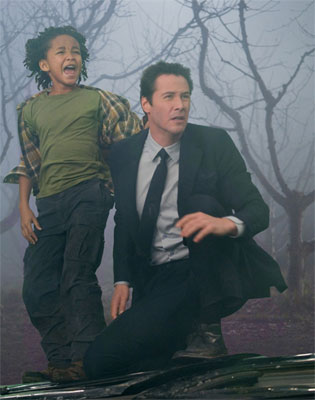 Scott Derrickson: I'll start. I think that when we were making the movie, I knew what the release date was going to be. I knew that it was going to be released in December of 2008. At that time, I didn't know who the candidates would be, let alone the president. But I think that I felt the way most Americans felt which was that we had slipped off track in a number of ways and like I said, gotten ourselves into some real jams, serious ones. I had I think also the same feeling that the majority of Americans had which was not one of cynical pessimism. I just really didn't feel that way about it. I felt good about the fact that it felt like the collective community of America that I lived in was recognizing its mistakes. That was really encouraging to see and to be a part of. I even looked back at the election and the way it was conducted and I feel like there was something uncynical about what's gone on in America in the last year. I knew that this movie would be coming out when that president, whoever it was going to be, was going to be elected and before he would have taken office. I just had faith and hope that it would be a time of optimism and it would be a time of expectation that there would be some significant changes in this country and that's not a partisan statement. That's just a statement of fact that we all know we made some mistakes. We've made mistakes. We've made some misjudgments and everyone I think is ready to correct them. Admit it and correct them and represent ourselves better, not just domestically but as part of the global community. I love the idea of making a big entertaining popcorn movie that had some of that uncynical point of view, admission of serious mistakes and serious problems that we have and recognizing those things. That's again where I was trying to respect the original film because for a Cold War film, it's surprisingly introspective. It's surprisingly turning the lens back on America as opposed to Invasion of the Body Snatchers where it's about the Red Scare. So that was, for me, very much in mind.
Scott Derrickson: I'll start. I think that when we were making the movie, I knew what the release date was going to be. I knew that it was going to be released in December of 2008. At that time, I didn't know who the candidates would be, let alone the president. But I think that I felt the way most Americans felt which was that we had slipped off track in a number of ways and like I said, gotten ourselves into some real jams, serious ones. I had I think also the same feeling that the majority of Americans had which was not one of cynical pessimism. I just really didn't feel that way about it. I felt good about the fact that it felt like the collective community of America that I lived in was recognizing its mistakes. That was really encouraging to see and to be a part of. I even looked back at the election and the way it was conducted and I feel like there was something uncynical about what's gone on in America in the last year. I knew that this movie would be coming out when that president, whoever it was going to be, was going to be elected and before he would have taken office. I just had faith and hope that it would be a time of optimism and it would be a time of expectation that there would be some significant changes in this country and that's not a partisan statement. That's just a statement of fact that we all know we made some mistakes. We've made mistakes. We've made some misjudgments and everyone I think is ready to correct them. Admit it and correct them and represent ourselves better, not just domestically but as part of the global community. I love the idea of making a big entertaining popcorn movie that had some of that uncynical point of view, admission of serious mistakes and serious problems that we have and recognizing those things. That's again where I was trying to respect the original film because for a Cold War film, it's surprisingly introspective. It's surprisingly turning the lens back on America as opposed to Invasion of the Body Snatchers where it's about the Red Scare. So that was, for me, very much in mind. Paul Fischer: Could there be a sequel?
Scott Derrickson: Yeah, that's right. Six Months After the Night Following the Day That The Earth Stood Still. If you're asking about a sequel, I haven't heard any discussion about that.
Paul Fischer: Would you want to?
Scott Derrickson: Probably not.
Paul Fischer: Was the chalkboard scene with John Cleese designed to be musical?
Scott Derrickson: It's a real math equation about a real significant high physics theory about the universe and we tried to be truthful to the scientific aspects. I just did an interview with Discover and the interviewer was really surprised at little things in the movie, but that being the biggest one. We had an astrophysicist who worked with Keanu and John. I still remember watching them for quite a long time. I don't remember where we were in the production but for quite a long time in a room working out the back and forth of that and then we added material to make it longer at one point because just to get that kind of flow and rhythm to it, I didn't have much to do with that. I'm just remembering because it was really Keanu and the math guy, the theoretical physicist and John Cleese. The three of them just kind of figured that out and I saw it and thought it was fantastic.
Paul Fischer: How did you come up with the new look for GORT and why use nano technology?
Scott Derrickson: Yeah, the nano technology element was in the script which I thought was interesting so that was already there when I got involved with the project, but there was no real description of him in the screenplay. We started down the wrong path honestly because as I said, I looked at the original and tried to figure out what things can I really bring to it and GORT, what things can I bring from the original to the modern movie that audiences who don't know this film will still appreciate. I just couldn't quite make sense of why this thing would be in human form. It certainly can't look like this tin robot from the original. So we spent a lot of time designing fantastic alien monster creature things that got increasingly ridiculous. I mean, it got to the point where I remember sitting in a room with these two pieces of artwork that were like the current versions and just saying, "This looks like something that should be in a museum of modern art or in a park as a piece of modern art."
I didn't even know what I was looking at. And Jeff Okun, our visual effects supervisor, I'll never forget it. He was just standing in the doorway, and this is like after three or four months of doing this and he just was standing in the doorway, said, "Why aren't we just making it look like GORT?" And I remember, it was one of those moments, I just looked at him and I was like, oh god. I just didn't even want to acknowledge how dumb I felt when he said that. It was so obvious. It was like okay, yeah, you're right. Let's get rid of all of these. So we need to make it look and feel like the original somehow, but it needs to have the impact and the scale and the magnitude that a modern audience will find satisfying so we basically tried to find the best blend of that, how we could most keep it looking like the original without it falling short of what modern audience standards are for a sci-fi robot thingie. It was really that. That was the basic process and then the nano technology aspect of it, and I did think it was interesting. That is an interesting aspect to science fiction storytelling and certainly major part of science fiction literature right now. I like the idea of him having that be playing a role in and also helping to justify why GORT is in human form. It's not that he was built that way. He chose that shape to present himself so that started to make rational sense to me also.
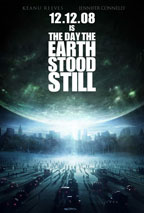
The Day the Earth Stood Still
Cast: Keanu Reeves | Jennifer Connelly | Kathy Bates | John Cleese | Jaden Smith | Jon HammDirector: Scott Derrickson
Rated: M
Running Time: 1 hr 32 mins
Klaatu Barada Nikto! In this remake of the 1951 sci-fi classic, Keanu Reeves stars as the alien who comes to earth. THE DAY THE EARTH STOOD STILL also stars Oscar winners Jennifer Connelly and Kathy Bates, as well as Golden Globe winner Jon Hamm (MAD MEN) and Jaden Smith (THE PURSUIT OF HAPPYNESS).
MORE
- Viggo Mortensen The Road
- 24 Cast Reunion
- Aaron Eckhardt No Reservations
- Aaron Eckhart The Dark Knight
- Adam McKay Step Brothers Interview
- Alan Alda Diminished Capacity Interview
- Alan Alda Diminished Capacity Interview
- Alex Dimitriades
- Al Pacino Oceans 13
- Alan Rickman Snow Cake
- Alan Rickman Sweeney Todd



